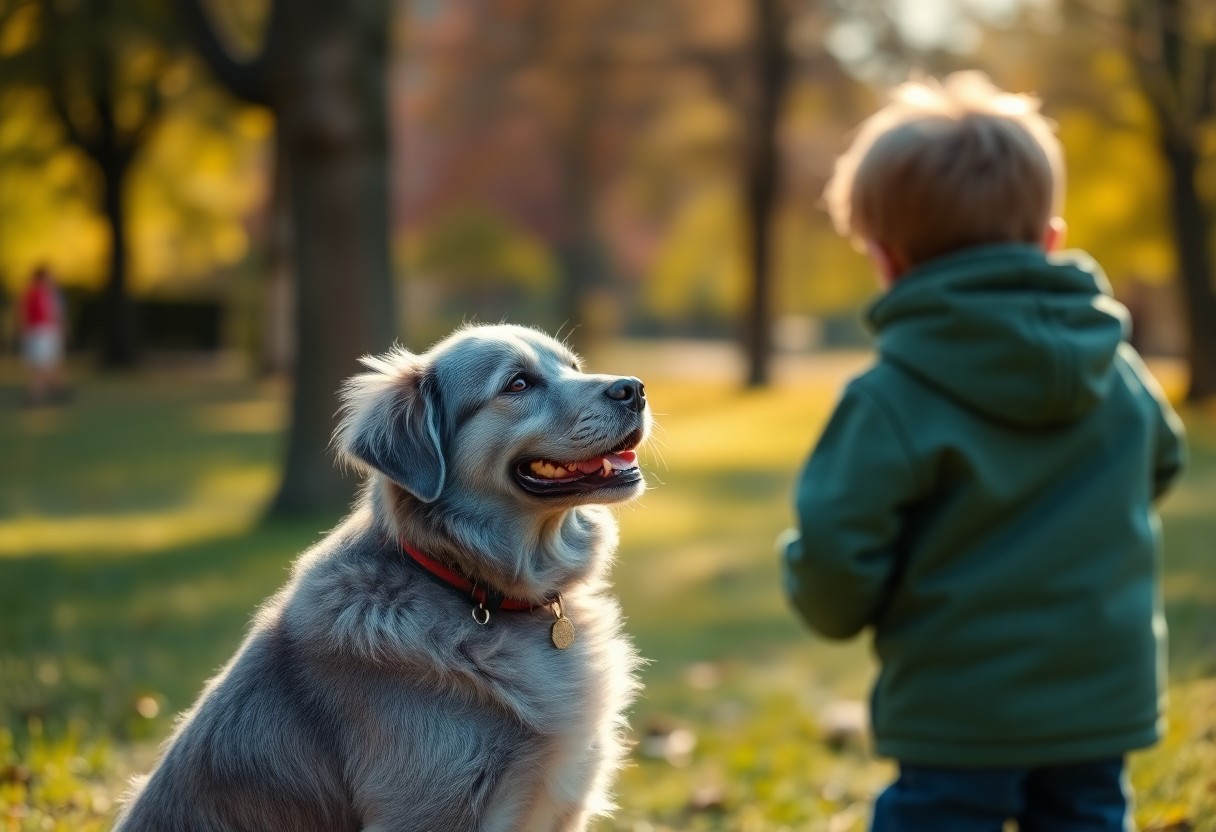You might be surprised to learn that older dogs can indeed learn new tricks. While some believe that age limits learning ability, studies show that mental stimulation remains beneficial regardless of your dog’s age. Engaging in training can enhance their cognitive function and strengthen your bond. However, it’s important to recognize any physical limitations your pet may have, as patience and positive reinforcement are key in easing them into new challenges. In this blog post, we’ll explore effective training methods for older dogs and address common misconceptions.
Understanding Canine Learning
Before launching on the journey of teaching an older dog new tricks, it’s important to understand how dogs learn. They possess a remarkable ability to adapt to their environment and form associations with their experiences. While training techniques may require some adjustment for older dogs, the core principles of reward-based reinforcement remain effective. Your approach should be patient and consistent, leveraging your dog’s inherent abilities to facilitate learning no matter their age.
Cognitive Abilities of Older Dogs
Abilities of older dogs may start to change, but they often retain a wealth of knowledge and experiences. Their cognitive function can decline, leading to slower processing speeds and reduced memory retention. However, you might find that your dog’s long-standing habits and learned behaviors remain intact, making it easier for them to pick up familiar commands. Gentle mental stimulation can enhance their cognitive abilities while building new connections with you.
The Impact of Age on Learning
Around your dog’s golden years, you may notice a shift in their learning capacity. While older dogs still possess the desire to learn, the speed and ease of acquiring new skills might be affected by age-related decline. Patience and understanding are vital, as older dogs may require extra time to grasp new concepts and behaviors. Their experience can also be an asset, as they often draw from previously learned tricks, creating a unique blend of old and new knowledge.
Older dogs often face challenges that can impact their learning ability. Cognitive decline may slow their response time and make it harder for them to remember new commands. However, engaging them with positive reinforcement and short training sessions can significantly enhance their learning experience. It’s important to create a supportive environment that encourages curiosity and exploration, which can lead to renewed interest in learning. Ultimately, adapting your training methods to respect their pace is the key to successful teaching for your beloved companion.
1. Older dogs are capable of learning new commands.
2. Consistent training boosts confidence in senior dogs.
3. Patience is vital when teaching older pets.
4. Mental stimulation benefits dogs of all ages.
5. Tailored approaches enhance learning for older dogs.
6. Positive reinforcement encourages enthusiasm in training sessions.
Training Techniques for Older Dogs
The key to effectively training older dogs lies in understanding their unique needs and adapting your methods accordingly. Using techniques that take into account their physical capabilities and cognitive functions will make the process smoother and more enjoyable for both you and your dog. Utilizing patience and consistency is vital to building trust and fostering a positive learning environment.
Positive Reinforcement
For older dogs, positive reinforcement is an effective training strategy. This approach involves rewarding your dog with treats, praise, or affection when they successfully complete a command or task. By focusing on what they do right rather than punishing mistakes, you create a supportive atmosphere that encourages learning and strengthens your bond.
Tailored Training Approaches
Dogs benefit from training methods specifically designed for their age and capabilities. As they grow older, their cognitive functions may decline, and physical limitations can also impact their ability to learn. Adapting your approach by modifying commands or using less strenuous activities will help maintain your dog’s interest and prevent frustration. This individualized training allows you to focus on your dog’s strengths while addressing any weaknesses, which leads to a more rewarding experience for both of you.
Approaches that cater to your dog’s unique needs may also include short training sessions to prevent fatigue and increased accessibility to learning materials, ensuring sessions are stimulating yet manageable. Incorporating short breaks during training can help sustain focus and motivation. Additionally, be mindful of your dog’s health conditions when selecting activities and challenges. Training should consistently be a positive experience, as this reinforces your dog’s willingness to learn and engage with you. By tailoring your strategies, you can effectively support your older dog’s learning journey.
Common Myths About Older Dogs
Despite the common belief that older dogs are set in their ways and unable to learn, this is far from the truth. Many people mistakenly assume that a senior dog is beyond training or that they lack the ability to adapt to new commands and environments. In reality, older dogs can be just as eager to learn and form new habits when given the right encouragement and approach.
The Myth of Stubbornness
Among the many misunderstandings surrounding older dogs, the notion that they are stubborn often prevails. You may notice that your senior dog takes longer to respond or doesn’t engage as quickly, leading to the false conclusion of stubbornness. However, this perception often masks their need for patience and understanding in their learning process.
Misconceptions About Physical Limitations
Against popular belief, older dogs are not always physically limited and may still enjoy active play and learning activities. Often, you may underestimate your dog’s potential due to age-related assumptions. In fact, many older dogs retain a surprising amount of energy and enthusiasm, allowing them to participate in training and exercise.
Indeed, it is vital to acknowledge that older dogs can often surprise you with their agility and stamina. While some may have limitations due to health issues, many maintain a strong drive to engage in activities. Providing regular vet check-ups helps you tailor a suitable exercise routine that respects their needs. By introducing modified games and mental stimulation, you can keep your senior dog both physically active and mentally sharp. This approach encourages a healthier lifestyle and solidifies your bond, proving that age is just a number when it comes to learning and enjoyment.
Health and Wellness Considerations
Now, when considering whether your old dog can learn new tricks, it’s vital to assess their overall health and wellness. Older dogs may face various health challenges, so understanding their physical and emotional needs is important. Regular veterinary check-ups can help identify any underlying conditions that could affect your dog’s ability to train. By addressing any health issues upfront, you’re setting the stage for successful learning experiences.
Physical Readiness for Training
On assessing your dog’s physical readiness for training, take into account their age, breed, and any existing health concerns. Older dogs might have joint stiffness or reduced stamina, making gentle, low-impact activities ideal. Monitor their response to training exercises and adapt as needed to prevent injury while still encouraging engagement.
Mental Stimulation and Engagement
Readiness for mental stimulation can significantly enhance your dog’s learning potential. Engaging your older dog in activities that challenge their mind can lead to a more fulfilling quality of life. Simple puzzles or scent games are excellent ways to stimulate their brain without the physical exertion that may be taxing. Prioritize patience and positive reinforcement as you introduce new concepts. This approach not only helps your dog learn but also strengthens the bond you share, making the experience rewarding for both of you.
This type of mental engagement is vital, as it keeps your dog’s mind sharp and can even help stave off cognitive decline. Incorporating varied activities and puzzles into your dog’s routine will not only offer an enjoyable challenge but also provide necessary mental exercise. Always be attentive to your dog’s responses—if they seem tired or frustrated, it’s important to adjust the difficulty and keep sessions short and fun, ensuring that learning remains positive.

Success Stories: Older Dogs Learning New Tricks
Many dog owners have experienced the joy of watching their older pets master new skills. With patience and consistent training, older dogs can surprise you with their ability to learn and adapt. These heartwarming success stories showcase the possibility of transforming the behavior and engagement levels of senior dogs through targeted activities.
Case Studies and Testimonials
Above are some remarkable statistics highlighting the achievements of older dogs learning new tricks:
- 80% of dogs aged 7 and older benefited from basic obedience training.
- 65% learned advanced tricks like retrieving items upon request.
- 75% increased overall activity levels after engaging in training sessions.
- 90% of owners reported improved bond with their pets post-training.
Long-Term Benefits of Training
Case studies demonstrate that the benefits of training your senior pet extend beyond just learning tricks. Dogs that participate in ongoing training may experience enhanced mental stimulation, leading to improved cognitive function and reduced anxiety. This commitment to learning can contribute to a more harmonious household and increase your dog’s adaptability to new environments or changes.
Dogs of all ages can benefit from learning new skills, which keeps their minds sharp and bodies active. Regular training can help to alleviate boredom and behavioral issues, positively impacting their overall well-being. Socialization opportunities presented during training can also foster a sense of confidence and comfort in your furry friend. Engaging with your older dog through training can lead to a fulfilling and enriched life for both of you.
Tips for Owners
Once again, as a dedicated owner, you can help your old dog embrace learning new tricks by following a few key strategies:
- Be patient and consistent
- Keep training sessions short and engaging
- Use positive reinforcement
- Adjust training techniques according to your dog’s energy levels
- Incorporate familiar commands into new lessons
Any effort you put into this process can lead to successful outcomes for both you and your furry friend.
Setting Realistic Goals
With any training, it’s important to set realistic goals for your old dog. Break down learning into small, achievable tasks that gradually build confidence and skill.
Creating a Positive Environment
Around your dog, create a positive environment that encourages learning. Ensure that training areas are free from distractions and that your dog feels comfortable and safe.
In addition, use a variety of positive reinforcement techniques such as treats, praise, and affection to motivate your old dog. Always greet your dog warmly during training sessions and keep sessions enjoyable to nurture a strong bond. Adequate breaks should also be provided, preventing your dog from feeling overwhelmed. This supportive atmosphere can make a significant difference in your dog’s willingness to participate and learn.
Final Words
Conclusively, you can teach an old dog new tricks by understanding the unique challenges involved in the process. With patience, consistency, and positive reinforcement, your senior canine can learn and adapt just as much as a younger dog. Engaging in this journey not only enhances your bond but also enriches your dog’s life. For insights into this process, you might find it useful to explore You Can’t Teach An Old Dog New Tricks (Without Learning ….
 wagwagtail "only love can make your dog wag her tail"
wagwagtail "only love can make your dog wag her tail"
